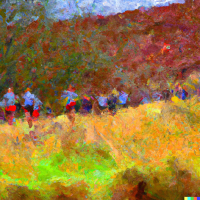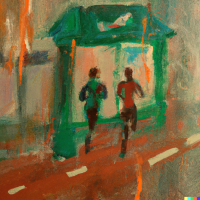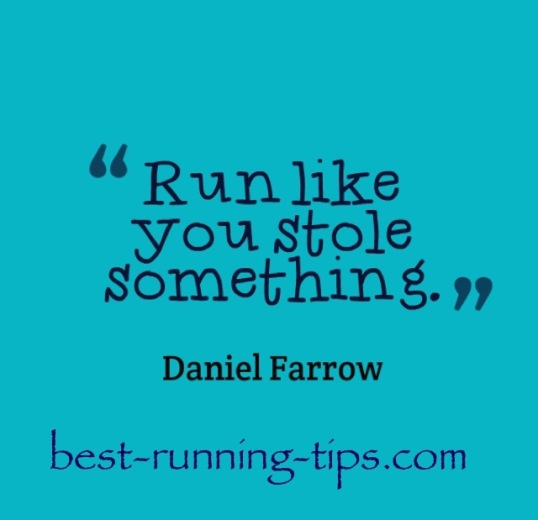Marathon Pacing Strategy - Use These Tips and Tricks to Hit That Marathon Pace Goal

It assumes you know what your marathon goal is going to be. You have nailed that down.
Now, it comes down to execution.
There are many areas of marathon preparation where we go wrong. Not thinking properly about our marathon pacing strategy is definitely one of them.
When you are not sure about your marathon goal yet, please check out the following page which provides you with all the tools and tips you need to establish that goal: Marathon Pace Strategy - Use the Ultimate Marathon Pace Guide to Learn What Marathon Time to Aim For.
Now, on to the marathon pacing tips.
So, how should you run your marathon?
Marathon Pacing and Splits - Positive, Negative, Even...

One of the most important concepts in determining race strategy is splits.
Running positive splits means running the first part of the race faster than the second part.
Running negative splits means running the first part of the race slower than the second part.
Running even splits means running pretty evenly throughout the race.
What do you think works best for a good race performance?
I'll get back to that later on this page. You have a think about it in the mean time!
Marathon Pacing and Breaking Up Your Race in Parts
A marathon is a long, long race. It's not only a physical battle, but also a mental battle. One of the elements I found that helped tremendously is breaking up the race in parts.

In order to make the race experience more relaxing and to stop myself from adjusting my speed every 10 seconds, I have found that breaking up a race in parts is really helpful!
I even do it with half marathons. I take three 7km blocks. That's about 4.3-4.4 miles, but you could use 4 miles, 4 miles and 5.1 miles for example if you prefer to split the race in mile-blocks. Anyways, for those 7km blocks I decide how fast I'd like them to be.
And I set up these 7km blocks in my GPS running watch as well so that my GPS keeps track of the speed I am running in these blocks.
Same for the 10k. I focus on the first 5k, then the next 3k and then the last 2k.
So, how to do it for the marathon? Well, you probably need to work it out for yourself what works best for you. I like the 7km splits (6 x 7km), it's long enough to get into a rhytm, yet short enough that you can make adjustments as you go.
Marathon Pacing and Splits Again - What's Your Answer?
Now, what do you think you need to do when running a marathon. Run positive, even or negative splits?
Well, in my opinion, negative splits is the best marathon pace strategy.
I'll give you a few reasons:
The horrible feeling people get when they have to slow down in the last part of a marathon is due to their bodies running out of glycogen. When you run negative splits, you have got a good chance that your glycogen storage is just sufficient to finish the race!

Not you.
When you run negative splits, you'll actually be speeding up (a little, not a lot) in the second part of the race. The result will be that you will be passing dozens and dozens of runners, which will lift your spirits and will help you finish strongly.
Starting off slightly conservatively, you can assess how you feel at the half-way mark. And trust me, if you are not feeling well at the half-way mark, you are not going to feel better during the 2nd half of the race!
When you have negative splits strategy you can decide not to speed up in the 2nd part of the race, rather than going out too fast and then having to cling on for dear life.

Overestimating my abilities, I have had some shocking races in which I'd run too fast in the first part and would then suffer through the second part of the race.
It's a painful feeling when all the power in your legs is gone, you can't hit your splits anymore and your months of training are going down the drain, all because you did not put a race plan together...!
And, as a final remark, did you realize that most world records have been set by runners doing negative splits? So, let's take the learnings from the elite runners and apply them to ourselves!
So, how much of a negative split should you run? Well, have a look at my marathon calculator page and check out my marathon pace calculator and marathon pace chart.
Marathon Pacing and Confidence
I hope the above has been convincing enough to get you to think about doing negative splits.

Because the reality is, doing negative splits takes a bit of bravery and confidence. After all, you do feel like in that second part of the race you'll need to make up for a slower performance in the first part. Can you do that? Will you be strong enough?
So, yes, that does take some confidence. But of course, you can train this! A good marathon training schedule will contain marathon pace training runs. Why not do some of those with negative splits so you'll know what it feels like?
Just an idea... :)
Marathon Pacing - The Start of a Marathon
I have been in big races with thousands and thousands of people running. That first kilometer can be terrible. People everywhere. You feel like you are losing time, etc.
Now, here's a thought. Just stay calm. Don't worry about losing 15-20 seconds in your first kilometre.
The really big mistakes you can make here are:
Just try to set into your marathon pace and gain back your lost time slowly over the space of 5-15km. You have got time to get back those few seconds. Hours!
Marathon Pacing - Some Other Considerations
 Now,
just on to some other tips and tricks in this marathon pacing
guide to round off the selection!
Now,
just on to some other tips and tricks in this marathon pacing
guide to round off the selection!What is the course like?
It will be crazy to try to stay on a certain pace, because a calculator said so, when you are facing a steep hill.
Likewise, going downhill?
Then it will be easy to run faster without tiring.
So, keep in mind what the course will be like.
Pretty much every marathon has got a course map on their website. And if it is relevant they'll provide an elevation map as well.
Check out running forums and look up how people describe their race experiences for your specific marathon. Ask questions on what to expect, what to look out for, etc.
Of course, here the use of the marathon pacing tip I gave you earlier will help a lot, i.e. break up your race in larger parts. Stop focusing on that 1km-split or 1 mile-split! Just look at the pace over 7km bands (or something likewise in miles).
What if you are in a group and the group is running too slow or too fast?
This is a really hard one. It depends.... Probably not the answer you were after.
Group is faster than you? When it is still early in the race (first 15k), don’t try to stick with a group that is faster, even if it is only ten seconds per mile, you’ll pay for it in the second half!
Group is slower than you? Well, when they are much too slow, then you'll just have to break free from the group. However, if the weather is bad (windy especially) there are benefits to running in a group.
So, when the group is only a little slower than what you want to run (e.g. five seconds per mile) then sticking with the group might be good for a little while.
It is just easier to run in a group, and especially when there is wind for example, running in a group will help you safe some energy for later in the race.

Build in the half-way checkpoint
The half-way checkpoint is an important one. Half-way in you should be feeling reasonably good. Sure, you have just covered 21.1k (13.1 miles) so you are not as fresh as you were at the start of the race. But, you shouldn't be feeling spent.
Especially when you have been doing negative splits, because you'll be expected to speed up a bit during the second part of the race!
So, feel bad half-way in? Then reduce your speed somewhat and see how you feel at the 32k mark (20 miles). You can re-assess your plans at that point and see how you feel.
As I say quite a few times on this website, learn to listen to your body. It will tell you whether it is a good idea to push for your PB or not.
The last 10k / six miles
The last part will most likely be painful. It is for most of us. Even if you have run negative splits, you will have gotten tired by now. Your mind starts playing tricks on you. One thing that may make you feel better is having a look at how other people are suffering.
You are not the only one in pain, you will get through. Focus on maintaining your pace. If that is too hard focus on reeling in runners.
Just focus on the next person up and try to overtake them (not by doing crazy sprints of course, just by running your pace).
Some of us find that it helps to just count the people you are passing from the 20 mile mark. A friend of mine had a lot of success with that.
As he went from mile to mile he tried to keep the score per mile and tried to improve upon his score every mile. He nailed those last six miles. Despite the pain he had something very short-term to focus on and it helped him a lot.

When running your first marathon, it is very likely that the last 10k (6 miles) will be painful. There is nothing quite like it. Very new to running and not a lot of race experience? I can’t quite prepare you for that feeling.
In your training you will have experienced it a few times during your long runs. It's that emptiness, that feeling you can't go on and just want to cut your run short by quite a few miles. The thing that keeps you going, usually, is that you need to get back home!
Just keep on putting one foot in front of the other, focus on reeling in runners, or staying with a group, and keep in mind that everybody else around you feels exactly the same!

After your marathon, not in the first hour after, but in the first few days after, do a post-race evaluation.
Work out what went well. Work out what went wrong (if anything). You may have been running with a GPS heart rate monitor, so have a look at your splits.
Ask yourself a few questions:
You can ask yourself way more questions than that. When you had a bad experience, try to work out what you'd have to do differently next time.
Look back at your training and see how you can improve for next time!
Home > Marathon Training Tips > Marathon Pacing




